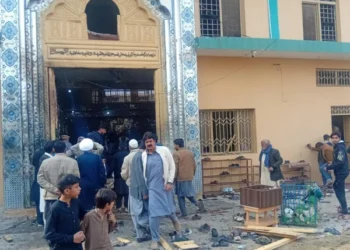In yet another tragic incident highlighting the persistent threat of terrorism in Pakistan, three Federal Constabulary (FC) personnel were martyred when terrorists belonging to the banned outfit Fitnat-ul-Khawarij launched an armed attack on an FC fort in Hangu district, Khyber Pakhtunkhwa (KP). Security forces responded swiftly and decisively, killing five terrorists, including a facilitator, in a retaliatory counter-operation. The exchange of fire underscores the ongoing challenges faced by law enforcement agencies in their fight against militancy, particularly in regions bordering Afghanistan.
Details of the Attack
According to District Police Officer (DPO) Hangu, the terrorists targeted the FC fort with heavy gunfire in an attempt to breach the security cordon. Despite the surprise element of the attack, FC personnel stood their ground, defending the fort valiantly. Unfortunately, three personnel embraced martyrdom during the exchange of fire.
The DPO further revealed that security forces swiftly retaliated with precision fire, eliminating five terrorists, including a key facilitator who had been providing logistical support and intelligence to the attackers. The fierce gun battle continued for several hours, after which the fort was secured and clearance operations were launched in Tori Wadi, a nearby locality known for militant hideouts.
Retaliatory Action and Joint Operation
The counteraction by the FC and police was swift and coordinated. Intelligence reports suggest that the facilitator played a critical role in enabling the attack, providing both weapons and guidance to the terrorist group. His elimination is seen as a significant blow to militant networks operating in the area.
The joint operation, comprising FC commandos and police units, extended beyond the fort into suspected militant strongholds. Security forces conducted targeted raids in Tori Wadi, sealing off escape routes and searching for accomplices. Helicopter surveillance and ground reinforcements were deployed to ensure complete neutralization of any remaining threats.
Officials have confirmed that weapons, ammunition, and communication devices were recovered from the slain terrorists, indicating their intent to launch a large-scale assault.
Federal Interior Minister’s Statement
Federal Interior Minister Mohsin Naqvi strongly condemned the attack while paying glowing tributes to the fallen heroes. In his official statement, he emphasized:
- The sacrifice of the martyred soldiers had thwarted a major terrorist plot.
- The attack bore the hallmarks of foreign-sponsored terrorism, particularly hinting at the involvement of Indian-backed elements seeking to destabilize Pakistan.
- The government remains steadfast in its resolve to eliminate terrorism from its roots.
Minister Naqvi also assured the families of martyrs that their sacrifices will never go in vain and prayed for the swift recovery of the injured personnel. He reiterated the government’s commitment to equipping security forces with modern technology, intelligence-sharing mechanisms, and advanced weaponry to combat terrorism effectively.
Background: Terrorism in Khyber Pakhtunkhwa
Khyber Pakhtunkhwa, particularly districts like Hangu, North Waziristan, and South Waziristan, has long been a hotspot for terrorist infiltration and cross-border militancy. The proximity to the Afghan border provides strategic depth to militant groups who exploit porous frontiers to regroup and launch attacks.
Despite successful operations like Zarb-e-Azb and Radd-ul-Fasaad, splinter groups and sleeper cells of banned outfits such as Tehreek-e-Taliban Pakistan (TTP) and its affiliates continue to pose a challenge. Hangu itself has witnessed several deadly incidents in the past, including sectarian violence and suicide bombings targeting security forces.
Security experts argue that the resurgence of attacks in KP is linked to the evolving political dynamics in Afghanistan, where militant sanctuaries still exist, posing direct threats to Pakistan’s internal security.
Martyrs: The Ultimate Sacrifice
The identities of the three martyred FC personnel have not yet been made public, pending official notification to their families. However, sources within the police department confirmed that they were young officers dedicated to protecting their homeland.
The incident has once again highlighted the extraordinary sacrifices of Pakistan’s security forces, who continue to lay down their lives in the fight against extremism. Each martyr’s sacrifice adds to the long list of thousands of soldiers and officers who have given their lives to ensure peace for future generations.
Public Reaction and Local Response
The attack has sparked grief and anger among the residents of Hangu. Local community leaders and political representatives condemned the cowardly act of terrorism, praising the bravery of FC personnel. Many citizens held special prayer gatherings for the martyrs while urging the government to accelerate efforts against terrorist networks in the region.
Social media platforms also trended with hashtags such as #HanguAttack and #OurMartyrsOurPride, where citizens expressed solidarity with the families of the martyred soldiers.
Government and Military’s Anti-Terror Resolve
The Government of Pakistan, in coordination with the military leadership, has vowed to continue its zero-tolerance policy against terrorism. Recent intelligence-based operations (IBOs) across KP and Balochistan demonstrate a renewed determination to dismantle terrorist infrastructure.
According to security analysts, the elimination of five terrorists, including a facilitator in Hangu, is a significant achievement, yet it also raises alarms about the re-emergence of organized cells in sensitive areas. Analysts emphasize the need for:
- Enhanced border management with Afghanistan.
- Improved intelligence-sharing between police, military, and civilian agencies.
- Socio-economic development programs in militancy-prone regions to address root causes of extremism.
Broader Context: Regional Terror Threat
The Hangu attack is not an isolated event but part of a larger pattern of terrorism in the region. Over the past few months, Pakistan has witnessed:
- Suicide bombings in Khyber Pakhtunkhwa and Balochistan.
- Targeted attacks on police check posts and army convoys.
- Increased activity from groups allegedly receiving foreign funding.
The involvement of Fitnat-ul-Khawarij, a group notorious for sectarian violence and ties with international terror outfits, signals a dangerous escalation. Security officials maintain that dismantling such groups requires not only kinetic operations but also counter-ideological campaigns to curb radicalization.
Conclusion
The Hangu FC fort attack serves as a stark reminder of the sacrifices made by Pakistan’s security forces in their relentless battle against terrorism. The martyrdom of three brave personnel, coupled with the successful elimination of five terrorists, highlights both the cost and effectiveness of the ongoing struggle.
While the government and armed forces remain resolute, the incident underscores the need for continuous vigilance, regional cooperation, and national unity. The people of Pakistan, particularly in militancy-affected regions, continue to pin their hopes on the courage of their security forces and the determination of the state to ensure a peaceful, secure future.

























